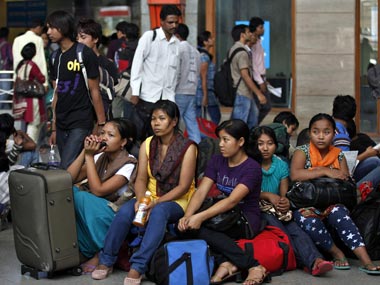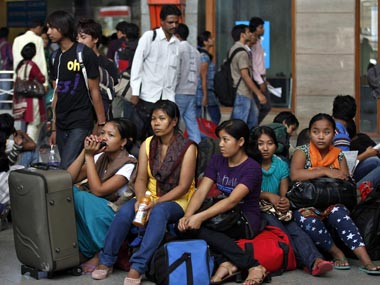“Bulk of the rumours that triggered panic among people of northeastern states in Karnataka, Tamil Nadu and Maharashtra were sourced from Pakistan, Union Home Secretary R K Singh said. “A total of 76 websites were identified where morphed images were uploaded and bulk of these were uploaded in Pakistan,” Singh told PTI,” Firstpost
had reported. Here we go again, blaming Pakistan for the newest problem on the block. Perhaps RK Singh is correct – and that the bulk of the rumours originated in Pakistan. What Singh, the home minister, the prime minister and the political classes in India (all of them) should spend time on is why it was so easy for citizens of the North-eastern states to believe in the rumours. Tomorrow, it could be a rumour of ‘north Indians’ being targeted in Mumbai, Marwaris being targeted in Assam, Tamilians being targeted in Karnataka and Kerala, Malayalees being targeted in Tamil Nadu, upper castes being targeted in UP, Dalits being targeted in Bihar, and so on. [caption id=“attachment_422712” align=“alignleft” width=“380”]
 In the current ‘exodus’, the political parties went into a game of one-upmanship. AP[/caption] All these possible rumours, wherever they might originate, will be easy to believe. They would be easy to believe because, over the decades, all political parties have looked the other way when one section of society has targeted another because such events suit their political ends. If, over history, the state machinery had cracked down on the offenders (even in the pre-mobile telephony and pre-Internet days), citizens who now hear of such rumours would have felt confident that, even if the rumours held a semblance of truth in them, they would be protected. What we see is the worst of vote bank politics every time something like this rises. In the current ‘exodus’, the political parties went into a game of one-upmanship (the blame game on the illegal immigration from Bangladesh) before attending to the more pressing issue – making those who were targeted feel safe across the country. Politics should have come later. Yet, all political energies of the two principal parties in the country (currently) are focused on the possible political gains and losses that could accrue. How does it matter who is responsible for the rumours? The rumours give politicians a new issue that, if used well, could harvest votes for one alignment of parties or another. The tragedy in the current instance is that none of political parties involved – the UPA government at the centre, the BJP government in Karnataka, the Congress government in Andhra Pradesh, the coalition government in Maharashtra and the various political parties in the north-eastern states – have been able to convince the targeted citizens that they would be safe and looked after if they chose to stay in Bangalore, Hyderabad and Pune. The lack of confidence is telling and should be of concern to the political classes. But the politicians are busy working out possible gains and losses in terms of votes and seats. And, as is their wont, they play the blame game and take solace in it. This time, the centre finds that Pakistan is responsible. That attempts to get the Centre off the hook. By today, the various state governments will use Singh’s statement to get themselves off the hook. The very statement diverts the issue from why the exodus took place in the first place. The issue is not the rumour, and nor is it where the rumours originated. The issue is why the victims could find the rumours so easy to believe — and why statements by the politicians promising protection were so difficult to believe.
In the current ‘exodus’, the political parties went into a game of one-upmanship. AP[/caption] All these possible rumours, wherever they might originate, will be easy to believe. They would be easy to believe because, over the decades, all political parties have looked the other way when one section of society has targeted another because such events suit their political ends. If, over history, the state machinery had cracked down on the offenders (even in the pre-mobile telephony and pre-Internet days), citizens who now hear of such rumours would have felt confident that, even if the rumours held a semblance of truth in them, they would be protected. What we see is the worst of vote bank politics every time something like this rises. In the current ‘exodus’, the political parties went into a game of one-upmanship (the blame game on the illegal immigration from Bangladesh) before attending to the more pressing issue – making those who were targeted feel safe across the country. Politics should have come later. Yet, all political energies of the two principal parties in the country (currently) are focused on the possible political gains and losses that could accrue. How does it matter who is responsible for the rumours? The rumours give politicians a new issue that, if used well, could harvest votes for one alignment of parties or another. The tragedy in the current instance is that none of political parties involved – the UPA government at the centre, the BJP government in Karnataka, the Congress government in Andhra Pradesh, the coalition government in Maharashtra and the various political parties in the north-eastern states – have been able to convince the targeted citizens that they would be safe and looked after if they chose to stay in Bangalore, Hyderabad and Pune. The lack of confidence is telling and should be of concern to the political classes. But the politicians are busy working out possible gains and losses in terms of votes and seats. And, as is their wont, they play the blame game and take solace in it. This time, the centre finds that Pakistan is responsible. That attempts to get the Centre off the hook. By today, the various state governments will use Singh’s statement to get themselves off the hook. The very statement diverts the issue from why the exodus took place in the first place. The issue is not the rumour, and nor is it where the rumours originated. The issue is why the victims could find the rumours so easy to believe — and why statements by the politicians promising protection were so difficult to believe.
Anant Rangaswami was, until recently, the editor of Campaign India magazine, of which Anant was also the founding editor. Campaign India is now arguably India's most respected publication in the advertising and media space. Anant has over 20 years experience in media and advertising. He began in Madras, for STAR TV, moving on as Regional Manager, South for Sony’s SET and finally as Chief Manager at BCCL’s Times Television and Times FM. He then moved to advertising, rising to the post of Associate Vice President at TBWA India. Anant then made the leap into journalism, taking over as editor of what is now Campaign India's competitive publication, Impact. Anant teaches regularly and is a prolific blogger and author of Watching from the sidelines.
)